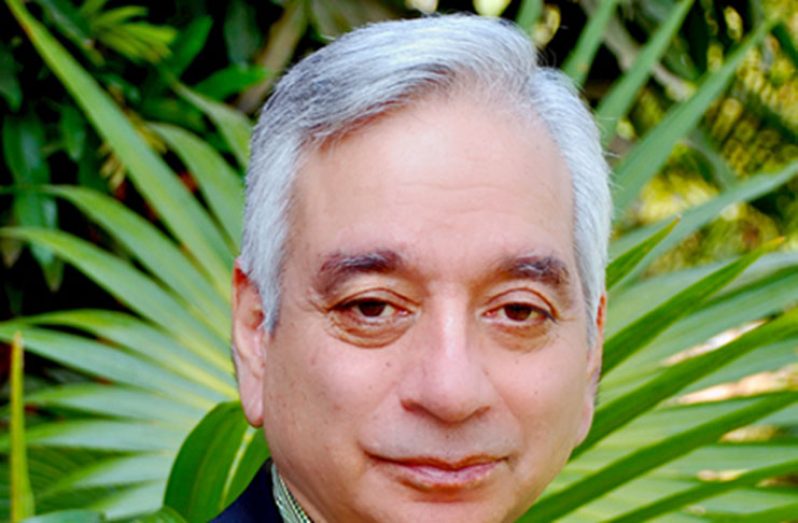–says renowned conservationist
THE Iwokrama International Centre for Rain Forest Conservation and Development can help lead Guyana in the implementation of the Green State Development Strategy, distinguished conservationist Dr Kamal Bawa has said.
“Guyana’s intact rainforest, together with relatively low population density and commitment at the highest political level, puts Guyana on course to developing such a ‘green’ economy. This is very unique; I can’t recall that many places on earth where this is the case,” he observed.
Dr Bawa is a professor at the University of Massachusetts, Boston, and the founder and President of Ashoka Trust for Research in Ecology and the Environment (ATREE), one of Asia’s top-ranked environmental think tanks, based in Bangalore, India.
From May 30-31, Dr Bawa participated in the Guyana “Green Growth” Sustainable Development Goal (SDG) lab in Guyana, which was put on by the Iwokrama International Centre, Biomimicry Roraima and the University of Massachusetts, Boston, in association with the Department of Environment, Ministry of the Presidency.
The lab, a forum for open discussion, was designed to identify key challenges of transitioning Guyana to a green-growth economy and to discuss potential opportunities and generate ideas for moving forward in implementing the Framework of the Green State Development Strategy (GSDS).
The lab brought together representatives of the public and private sectors, indigenous communities, non-governmental organisations, civil society actors, international organisations and academia.
The outcomes of the SDG lab will be shared with the government and will also be presented at the Ideas and Innovation Forum of the International Sustainability Science Conference in Stockholm, Sweden, in August 2017.
Dr Bawa sees the Iwokrama International Centre for Rain Forest Conservation and Development as being poised to help Guyana implement the Green State Development Strategy, which centres on the fact that conservation does not have to come at the expense of development.
“Iwokrama is developing models for sustainable use of natural resources; they are deeply committed to a participatory process in the conservation of natural resources, taking into account indigenous knowledge and local communities that are using those resources. I am very impressed by the work Iwokrama is doing and its potential to really contribute to this whole discussion and eventual implementation of this green economy,” he said.
INCREASING MOMENTUM
Dr Bawa has observed that there is increasing momentum to pursue so-called green growth, “how we find natural solutions to our pressing problems in a manner that we are not sacrificing economic growth.”
He said this can be seen in the fact that Guyana and other countries of the world have committed to the United Nations’ Sustainable Development Goals (SDGs).
“Our natural assets have a very important role to play in fulfilling those Sustainable Development Goals and I think Guyana, in many ways, can be a world leader in this regard.”
Iwokrama’s Sustainable Forest Operation is already demonstrating that well-planned and managed forestry operations are good business sense that reaps attractive dividends, while having little impact on biodiversity.
Further, it is also demonstrating that eco-tourism and ecosystem services are other ways of utilising the rainforest without destroying it.
Dr Bawa, who now specialises in sustainability and has worked in the Himalayas for a number of years on issues such as biodiversity and climate change, said that biodiversity is being lost at different rates in different parts of the world.
Despite improvements in some areas, he said “the loss still continues, and from that point of view, I think countries like Guyana, are of tremendous importance in the worldwide effort to save our precious biodiversity.
“I am an optimist. I believe the outlook is good — that the loss of biodiversity will decline — as we find ways of using biodiversity for economic gains.”
Dr Bawa also believes that Iwokrama and the University of Guyana can forge a strong partnership to address knowledge gaps and to develop the human resource capacity that will be needed in the pursuit of the green state.
The Iwokrama International Centre (IIC) was established in 1996 under a joint mandate from the Government of Guyana and the Commonwealth Secretariat to manage the Iwokrama forest, a unique reserve of 371,000 hectares of rainforest “in a manner that will lead to lasting ecological, economic and social benefits to the people of Guyana and to the world in general.”




.png)









